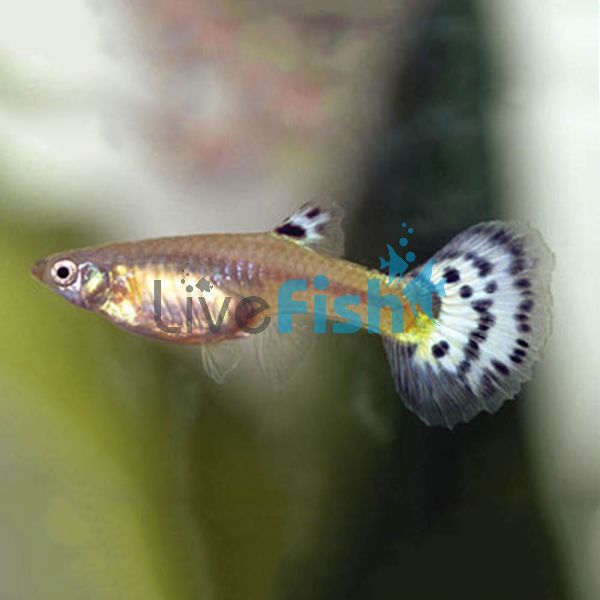Assorted Female Guppy 3.5cm
The Female Guppy may not be as colourful as the Males. But getting some females with your males will always be rewarding, As the contrast in colour compliment each other.
Rule of thumb is 1 guppy 2-3cm in size kept for every 4L of water.
Water Parameters -
pH - 6.8-7.8
Water Temp - 23-27 degrees
They are top feeders and will readily take most prepared foods. However, they should be given a diet with high vegetable content, so good mixture of foods is ideal.
- Buy 5 for $4.45 each and save 5%
- Buy 12 for $4.21 each and save 10%
- Buy 20 for $3.98 each and save 15%
The guppy (Poecilia reticulata) is one of the most popular freshwater aquarium fish species in the world.
Guppies require clean, oxygen-rich water. Making sure filters are cleaned regularly to ensure sure all biological filters are working properly, ensuring no ammonia or nitrite is present to help with the overall health of the fish.
Depending on conditions and genetics, Female guppies can grow up to 3-5cm (usually around 4cm) while Male guppies to 3.5-4cm.
They reach full-size maturity in about six months and this is the reason they are known for breeding so often and quickly.
Having a 3 female to 1 male ratio is advised.
Guppies are very active fish, they use an enormous amount of energy and being fed small amounts 3 times a day, with a variety of foods including dry, fresh, frozen or live foods will give the guppies great health and colour and ensuring they get the energy they need.
In saying this you can feed once a day sufficiently, especially when offering a variety of food and be careful not to overfeed! This will result in bloated/ unwell fish and will also affect your water quality where ammonia levels will rise quickly!
They are top feeders and will readily take most prepared foods. However, they should be given a diet with high vegetable content, so a good mixture of foods is ideal.
Guppies are probably the most popular livebearer among both aquarium owners and advanced breeders. The once humble, dull-coloured guppy has become a sort after fish for hobbyists with selective breeding resulting in many varieties of spectacular colourations and finn-age.
Depending on conditions and genetics, female guppies can grow up to 3-4cm, while male guppies to 3.5cm. They reach full-size maturity in about six months.
These fish are generally robust and tolerant of a wide range of aquarium conditions and for this reason, they are often recommended for beginners.
However, because of intense selective breeding, fancy guppies can be harder to maintain than their wild ancestors.
For this reason, it is important to try and match their tank conditions to their requirements of slightly hard and alkaline conditions, otherwise, they can become weak and prone to bacterial infections. They can become prone to bacterial diseases in soft water. Interestingly, guppies introduced into uncrowded home aquariums, where the water is well-aged and there is plant life and algae to graze, can make the transition from the previously described hard water, with little or no ill effects.
They are suited to a densely planted community tank with other peaceful fish. It is best to choose tank mates with similar water requirements - slightly alkaline hard water in their aquarium. Avoid stocking with larger or aggressive species which will nip at them because of their brightly coloured tails.
Male guppies may continuously ‘harass’ female guppies if kept together, this can be avoided by stocking males and females in separate tanks. This will stop the continuous breeding. As they are fish that breeds a lot.
While there are many beautiful wild forms of livebearers, guppies have been selectively bred throughout the world to produce a huge variety of colours, body shape and fin arrangement.
Livebearers have the common trait that they give birth to free-swimming young (ovoviviparous), instead of egg-laying like most other fishes. To achieve this, male livebearers have a modified anal fin called a gonopodium that is used to facilitate internal fertilization of the female. Once fertilised, the eggs mature inside the oviduct of the mother. The eggs then hatch internally and give ‘birth’ to the resultant offspring soon after.
The fry of guppies are about 7 to 10mm in length when born and are probably the most easily raised species as they will feed finely ground dry foods and do not require smaller live foods like most other species when beginning to feed. Males and females are generally easily distinguished as males have a smaller body with brightly coloured tails, with females also having a dark ‘gravid’ spot in the anal region. The ease of breeding means that it is the first species many hobbyists begin to breed
| Scientific Name | Poecilia Reticulata |
|---|---|
| Care Level | Easy |
| Common Names | Guppy, Livebearer |
| Diet | Omnivore |
| Fish Family | Poecilidae |
| Lifespan (years) | 2 |
| Max. Length (cm) | 5 |
| Min. Tank Volume (l) | 40 |
| Origin | Sth America and West Indies - Mainly bred for the Aquarium trade in Asia |
| Sociability | Peaceful |
| Venomous | No |
| Water Conditions | pH - 6.8-7.8, Water Temp - 23-27 degrees, GH 250-300ppm |




